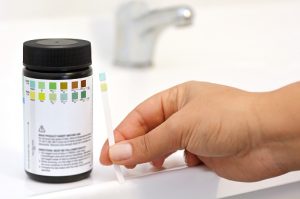 The presence of nitrates in urine is often considered a predictor of a urinary tract infection (UTI). Development of urinary tract infections are more commonly experienced by women, owing to their shorter urethra length compared to men. This allows for bacteria to have an easier time reaching and infecting the urinary tract system. UTI can potentially lead to inflammation and irritation in the lining of the urethra, kidneys, and ureters, leading to much patient discomfort.
The presence of nitrates in urine is often considered a predictor of a urinary tract infection (UTI). Development of urinary tract infections are more commonly experienced by women, owing to their shorter urethra length compared to men. This allows for bacteria to have an easier time reaching and infecting the urinary tract system. UTI can potentially lead to inflammation and irritation in the lining of the urethra, kidneys, and ureters, leading to much patient discomfort.
What do nitrates in urine mean?
The finding of nitrates in your urine will be obtained after performing a urinalysis, an analysis of your urine sample. This is usually done after telling your doctor that you have been experiencing symptoms such as burning during urination, discolored or foul-smelling urine, or any issue related to the urinary tract. However, pregnant women are usually asked to do this test before any such symptoms appear, as UTIs may not present with any symptoms in the initial phases.
Advertisement
A urinalysis can provide medical professions with many diagnostic values related to kidney health, but the overall health of the individual can be assessed as well. Various conditions such as diabetes and kidney disease will provide clues found in the patient’s urine that will prompt further investigation into those diseases.
The presence of nitrates in the urine is a direct indicator of a bacterial infection. On visual inspection of the urine, it may look darker than usual and possibly tea colored, but this is not a good indicator of infection. It is important to note that no diagnostic test is perfect and there is a possibility for false negatives, meaning a negative result was seen yet an infection exists. This may happen in cases of high urine levels of urobilinogen specific gravity and in cases where the infecting bacteria lacks the enzyme to reduce nitrates to nitrite. While this seldom occurs, other tests exist to further evaluate a possible diagnosis of UTI if suspected. False positives may also occur and possibly be the result of vaginal contamination of urine or even the use of an analgesic medication called phenazopyridine.
The most common cause of UTI is E. coli, but other possible bacteria include klebsiella, proteus, pseudomonas, and many more. E. coli and other gram-negative bacteria contain an enzyme called urease. This enzyme acidifies the urine leading to the creation of nitrates. Bacteria like E. Coli typically prefer acidic environments.
Symptoms of nitrates in urine
Urinary tract infections often present with a burning sensation during urination. When the patient is urinating, they may notice that their urine is discolored, bloody, or even carrying a peculiar odor, prompting their concern. If treatment is not sought out early in a UTI infection, it has the possibility of spreading up into the ureters, bladder, and even kidney, leading to severe complication. It may present with symptoms including low back pain, abdominal pain, or side pain. Chills and fever may also be present.
Treating nitrates in urine
When diagnosed with a UTI, a prescription for a course of antibiotics will be prescribed to treat the infection. It is important to complete the medication as instructed to fully resolve the UTI and prevent reoccurrence. While antibiotic use is considered the best course of action, there are several actions one can do to decrease the chances of developing UTIs from developing in the first place, they are as follows:
- Stay hydrated: By drinking adequate amounts of water every day, you can flush out bacteria that is in the urinary system. Some people believe that adding a teaspoon of baking soda to eight ounces of water and drinking it three times a day will help.
- Cranberry juice: A common drink to help treat UTI symptoms. It is import to get pure cranberry juice and not a mixture to benefit from its use. Symptoms may subside in two to five days with regular consumption.
- Apple cider vinegar: Thought to help the body fight off infection, it may help with UTI infections as well. Mix three teaspoons with water and consume the mixture for three days will help kill germs in the system.
- Over the counter medication: Using analgesic medication to help relieve pain can be useful. But getting a doctor’s opinion and some antibiotics will be the best method of fully resolving UTI symptoms.
Related: Bubbles in urine: Causes, symptoms, and treatment tips
